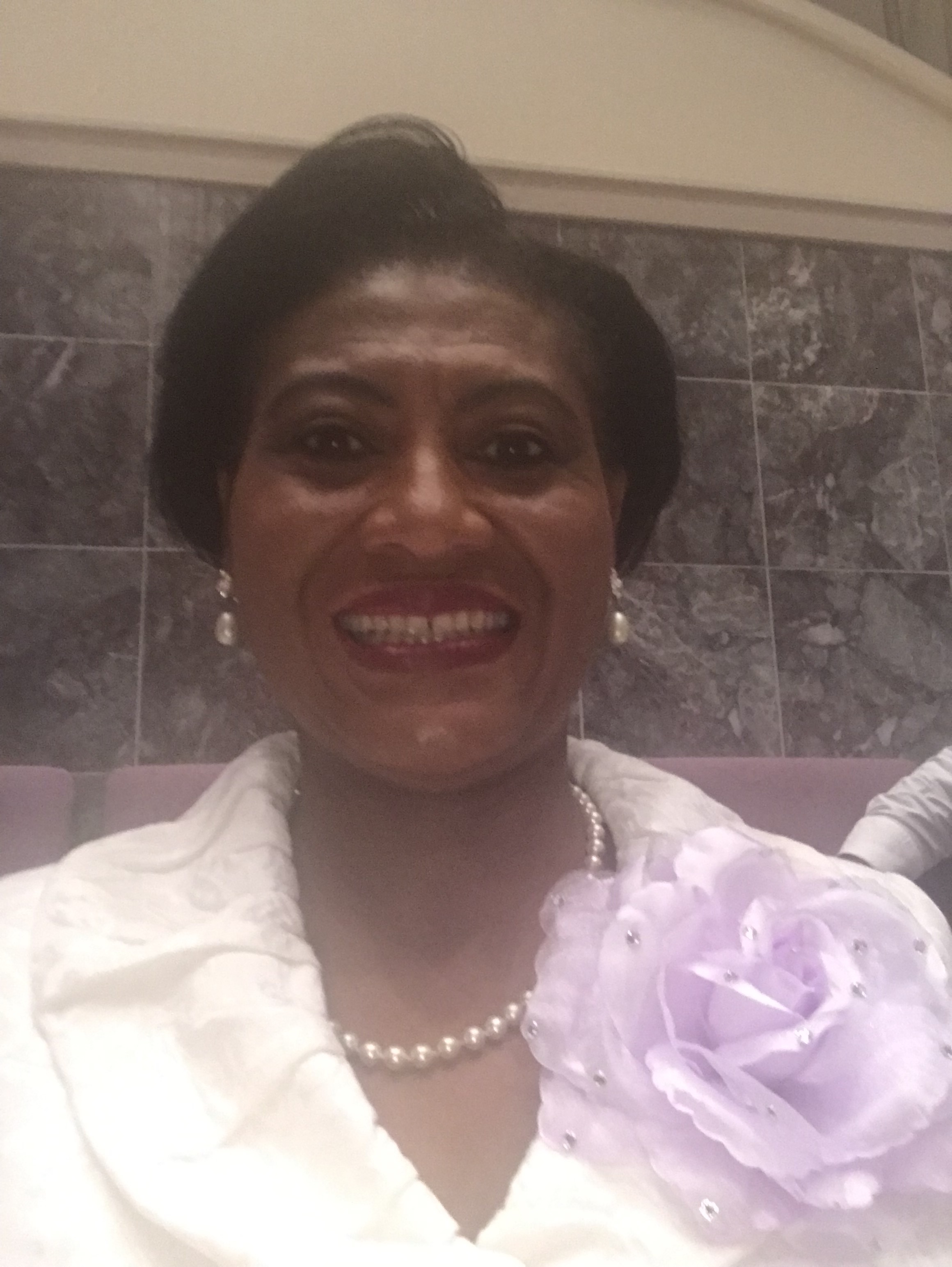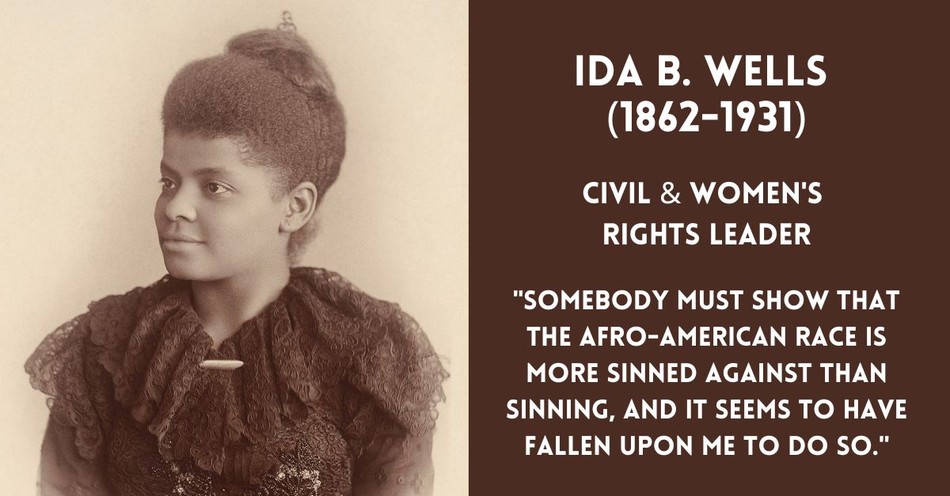Born into slavery during the Civil War, Ida B. Wells is best remembered as an American journalist who fought tirelessly against lynching during the Jim Crow era. Her resolve to fight for justice was informed by a strong faith that wasn’t afraid to challenge fellow Chrsiains for hypocrisy.
“Our American Christians are too busy saving the souls of white Christians from burning in hell-fire to save the lives of black ones from present burning in fires kindled by white Christians.” - Ida B.Wells
Fast Facts about Ida B. Wells
Hometown: Holly Springs, Mississippi
Career: Journalist and activist against lynching, including a period as co-owner of the Memphis Free Speech.
Causes: Traveled internationally, shedding light on lynching. Participated in Niagara Movement meeting that led to the Founding of the National Association for the Advancement of Colored People (NAACP).
Spouse: Wells married prominent African-American attorney Ferdinand Barnett in 1892, a widower with two sons. They had four children together.
10 Important Events in the Life of Ida B. Wells
Ida B. Wells was born in Holly Springs, Mississippi, in 1862. Holly Springs is 54 miles south of Memphis, Tennessee. She would later attend college in Holly Springs at Rust College (now Rust University), but a dispute with the college president led to her being expelled after two years.
2. In 1878, while visiting her grandmother, a yellow fever epidemic killed Wells’ parents and a younger brother. Wells later worked as a teacher to provide for her remaining siblings.
3. In 1884, Wells moved to Memphis. Today, a statue of Wells stands on the Ida B. Wells Plaza on Beale Street in downtown Memphis.
4. In 1884, Wells sued the Chesapeake and Ohio Railroad for forcibly removing her from her first-class seat despite having a first-class ticket. She won the case on the local level that year, but the Supreme Court reversed the decision in 1887.
5. In 1891, Wells turned her attention to writing. She wrote some newspaper articles criticizing the treatment of African-American children in the school system. When her teaching contract expired that year, the Memphis Board of Education refused to renew it. Wells focused on writing, becoming a co-owner of the Memphis Free Press.
6. In 1892, a mob lynched three of Wells’ friends, who owned a grocery store competing with a white-owned store’s business. Vandals shot one of the friends one night as they were protecting their store, and while they were arrested, the mob lynched them before they reached their trial. Wells investigated the matter, publishing several newspaper columns about the crime and releasing other information in pamphlets. After Wells’ newspaper officers and presses were destroyed, she moved to Chicago.
7. Between 1892 and 1895, Wells’ career as a journalist and speaker increased. She traveled in the American south to investigate lynchings, writing an in-depth report for the New York Age. She spoke in various American cities (and twice in the United Kingdom) about lynching.
8. In 1895, Wells married Ferdinand L. Barnett and published A Red Record, the first of four books she wrote. In 1896, Wells participated in the founding meeting of The National Association of Colored Women’s Club. This would be one of many African American women’s groups she founded or helped lead (others include the Chicago Alpha Suffrage Club and the Negro Fellowship League).
9. In 1897, Wells established Chicago’s first kindergarten classes at Bethel AME Church.
10. On March 25, 1931, Wells died in Chicago. Her daughter would later edit Wells’ uncompleted autobiography, Crusade for Justice, published in 1970.
10 Quotes by Ida B. Wells
1. “The way to right wrongs is to turn the light of truth upon them.”
2. “I honestly believe I am the only woman in the United States who ever traveled throughout the country with a nursing baby to make political speeches.”
3. “It is with no pleasure I have dipped my hands in the corruption here exposed. Somebody must show that the Afro-American race is more sinned against than sinning, and it seems to have fallen upon me to do so.”
4. “Virtue knows no color line.”
5. “There must always be a remedy for wrong and injustice if we only know how to find it.”
6. “The government which had made the Negro a citizen found itself unable to protect him. It gave him the right to vote but denied him the protection which should have maintained that right.”
7. “The South resented giving the Afro-American his freedom, the ballot box, and the Civil Rights Law.”
8. “I am only a mouthpiece through which to tell the story of lynching, and I have told it so often that I know it by heart. I do not have to embellish; it makes its own way.”
9. “The Afro-American is thus the backbone of the South.”
10. “There must always be a remedy for wrong and injustice if we only know how to find it.”
10 Things You Probably Didn’t Know about Ida B. Wells
1. Wells was born into slavery and freed through the Emancipation Proclamation. The home belonging to her parents’ slavemaster was later converted into the Ida B. Wells-Barnett Museum.
2. Ida B. Wells’s parents were socially active in politics (supporting the Republican Party) and education (her father helped start Shaw University, later known as Rust College).
3. Wells began teaching at a country school when she was only 14 years old. After her grandmother’s death, she and her two younger sisters moved to Memphis to live with an aunt, where she continued teaching.
4. Some of Wells’s diary excerpts reveal how she prayed earnestly to God to help the plight of her people.
5. Wells often joined with other African-Americans to raise public concern about racial injustice. In 1893, Wells joined Frederick Douglass and others in boycotting the World’s Columbian Exposition in Chicago, arguing it lacked African-American representation.
6. She had a pen name, Iola, which she used to write some of her earliest articles.
7. Wells’ tenacious faith in God gave her courage, believing that God would fight for her no matter what was happening. This included some occasions when Wells called out churches for their role in segregation.
8. Fueled by her faith in God, Wells worked tirelessly to bring light to the afflictions of African-Americans.
9. One of her editorials riled Memphis’ white citizens for writing editorials that criticized the common belief that black men raped white women and questioned the virtue of some white women. Mobs stormed her office and destroyed all of her equipment. Fortunately, she was out of town.
10. Wells wasn’t afraid to exhort high-ranking leaders to make changes. In 1898, Wells called upon President McKinley to make reforms regarding lynching. Later, she called on President Woodrow Wilson to stop discriminatory government hiring positions.
Classic Books by Ida B. Wells
Much of Wells' writing is easy to find today and still worth reading. Here are several collections of her work, including Wells' four books published during her lifetime.
2. Southern Horrors: Lynch Law in All Its Phases
3. On Lynching
6. Crusade for Justice: The Autobiography of Ida B. Wells
Further Reading:
20 Powerful Quotes from Martin Luther King, Jr. that All Christians Need to Read Today
What Would Jesus Say to a Society Desiring to Heal Racism?
A Biblical Case against Racism: More Work to Do
Benjamin Bannaky Met Racism in America
7 Responses Every Christian Heart Needs to Have Towards Racism
How Should Christians Respond to Racism?
How Martin Luther King Jr. Overcame “Christian” White Supremacy
Photo Credit: Circa 1893 photo by Mary Garrity, public domain. Restored by Adam Cuerden of the Google Art Project, made available by Wikimedia Commons. Graphic by G. Connor Salter.

This article is part of our People of Christianity catalog that features the stories, meaning, and significance of well-known people from the Bible and history. Here are some of the most popular articles for knowing important figures in Christianity:
How Did the Apostle Paul Die?
Who are the Nicolaitans in Revelation?
Who Was Deborah in the Bible?
Who Was Moses in the Bible?
King Solomon's Story in the Bible
Who Was Lot's Wife in the Bible?
Who Was Jezebel in the Bible?
Who Was the Prodigal Son?




.jpg)